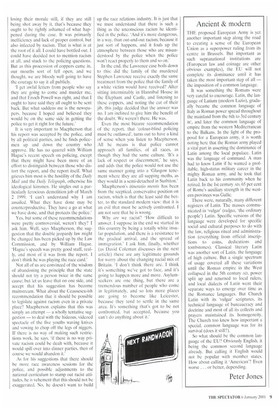Ancient & modern
THE proposed European Army is yet another important step along the road to creating a sense of the European Union as a superpower ruling from its centre in Brussels. But important as such supranational institutions are (European law and coinage are other obvious examples), the EU will not complete its dominance until it has taken the most important step of all — the imposition of a common language.
It was something the Romans were very careful to encourage. Latin, the language of Latium (modern Lazio), gradually became the common language of Italy as Roman power spread throughout the mainland from the 6th to 3rd century BC, and later the common language of empire from the western Mediterranean to the Balkans. In the light of the proposal for a European army, it is worth noting here that the Roman army played a vital part in asserting the dominance of Latin among the local populace. Latin was the language of command. A man had to know Latin if he wanted a profitable, high-status military career in the mighty Roman army, and he took that Latin back to his community when he retired. In the 1st century AD, 65 per cent of Rome's auxiliary strength in the western provinces was Gallic.
There were, naturally, many different registers of Latin. The masses communicated in 'vulgar' (vulgus, 'the ordinary people') Latin. Specific versions of the language were developed for specific social and cultural purposes to do with the law, religious ritual and administration (everything from official inscriptions to coins, dedications and tombstones). Classical literary Latin was another sort of Latin, the language of high culture. But a single spectrum of usage covered all these variations until the Roman empire in the West collapsed in the 5th century AD, power split up and returned to local rulers, and local dialects of Latin went their separate ways to emerge over time as the Romance languages. But Church Latin with its 'vulgar' scriptures, its technical language of bureaucracy and doctrine and most of all its collects and prayers maintained its homogeneity. The Church too knew how important a special, common language was for its survival (does it still?).
So what should be the common language of the EU? Obviously English, it being the common second language already. But calling it English would not be popular with member states. How about calling it 'American'? Even worse or better, depending.
Peter Jones


















































 Previous page
Previous page